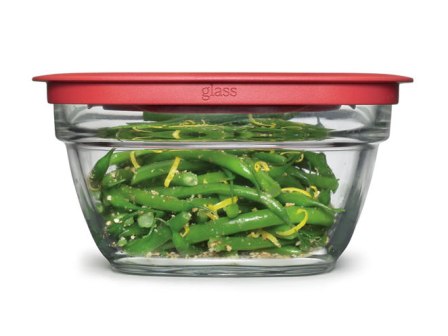Food Storage Advice and Tips
Food storage always seems to become an issue when you shop for longer than a week. There's never enough room to store foods where you want to and this greatly increases the chances that your food will spoil or become contaminated with bacteria or other harmful germs.
There are many ways to store your foods in your kitchen for use at a later date. I hate wasting food and am always looking for ideas to improve storage time for fruits, vegetables, and meats.
Whenever you go shopping, you buy a variety of foods that each have their own storage requirements. I call them requirements because they should be. But, unfortunately, storage of your food is totally up to you and the space you have in your kitchen and pantry.
Not everyone has the same amount of storage space. Some people live in tiny apartments with little to no adequate room to store their foods. Some of us live in descent sized homes with large kitchens and lots of space. Finding a proper place to store everything, in any event, can be a real chore.
There are ways to save space and still protect your foods from harmful bacteria, germs, mold, and other illness-causing viruses that love to hang around raw produce and meats. Taking your time to prepare your foods after returning from the store and storing them in sealed containers can save a lot of room in refrigerators, freezers, cupboards, and pantries.
Tips and Tricks for Food Storage
I have compiled a helpful list of a variety of things you can do to help properly store your food to make room in your kitchen, lengthen its shelf life, and keep it free from germs that can make you or your family sick.
1. Store or marinade raw meat that you will be eating in less than two days on the bottom shelf of the refrigerator so it won't leak and drip on other foods.
2. Discard all foods that are beyond their "use by" or expiration date.
3. Wash all untreated (non-packaged) vegetables and fruits in cool water and thoroughly dry with a paper towel before placing them in containers, vacuum sealed bags, or in produce bags. You want them as clean as you can get them before storing them so their contaminates don't spread to other foods.
4. If you are cooking food to store for a later date, make sure you seal it in a air-tight container and freeze it right away while it is still hot.
5. Keep cooked foods away from raw foods. You don't want to intermingle any foods that can cross contaminate.
6. If you are preparing food for freezing, get as much air out of the container as possible. I use a vacuum sealer system to bag up all of my raw and prepared foods for freezing. Also great for food storage are vacuum sealed containers; however, containers take up a lot more room than bags do.
7. If something is frozen and exceeds its "use by" date, you can still cook it immediately (within 6 hours) after it is defrosted. Discard it after 6 hours. If it is within it's "use by" date, use it within 2 days of defrosting.
8. Always cook foods right away after defrosting them in the microwave. Before doing research, I used to always defrost a whole package of bacon in the microwave and only used five slices. The rest would go back in the refrigerator for the next time. Do not do that. Pre-plan the use of things that you won't use all of, such as bacon, and defrost them properly in the refrigerator or in a sink with cold water.
9. It is okay to freeze meat if you defrost and cook it. Just don't reheat meat more than one time.
10. Package more liquid type foods you intend on freezing in containers and solid foods in bags. Trying to seal semi-hot soup in a vacuum seal back failed as it melted through part of the seal and spilled everywhere.
11. Store fresh vegetables in a produce bag designed to keep produce fresher, longer. Some fruits and vegetables such as avocados and peaches will ripen quickly in a paper bag on the counter top by trapping ethylene gas (a maturing agent). Fruits and vegetables that have been stored at room temperature in the market or store should be removed from their packaging and placed on the counter top in the open. Here's a great list of food storage times for fruits and vegetables.
12. Store meats separate from vegetables and fruits.
13. Never use an open container (this includes Styrofoam containers, plates, and cans), or one that does not completely seal, as a food storage device. Open containers allow germs and bacterias to easily invade the food.
14. Regularly clean your food storage areas (fridge, freezer, cupboard, counter top, table top, and pantry) with disinfectant and wipe again with a damp clean rag or towel to remove chemicals.
15. Once you place food in a storage container or bag, wipe off the outside of the container to ensure there is no outer contamination from spills.
16. Inspect all storage bags for holes or leaks before storing food in them.
Storing your food is a great way to make it last in the kitchen. Improper storage can cause faster than normal spoilage, potential for food borne illness spread, and unnecessary messes. Keep your food safe and healthy for the entire family.
